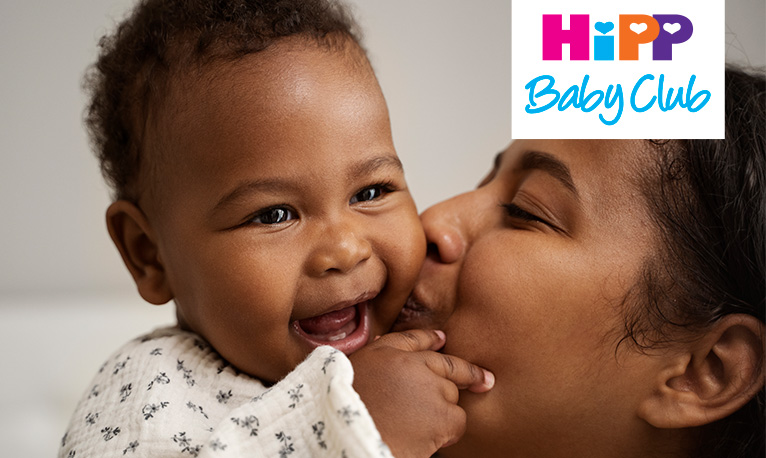A guide to bonding with your newborn
Newborn | | HiPP Organic
The first 24 hours with your newborn are a magical but often also an overwhelming experience. You may feel an instant connection and rush of love that is hard to put into words. But not always – for some mums it takes time to build a bond and that's okay.
So, how do you nurture this bond and make it stronger? In this blog post, we'll explore some tips for bonding with your newborn during those first 24 hours. Whether it's through skin-to-skin contact or simply talking to them, we've got you covered on all the ways to create a special connection with your little one right from the start. Let's dive in!
The importance of bonding with your newborn
The first hours after birth are such an important time for both the mum and baby. It's sometimes referred to as the 'golden' first hour. Which is why the environment should be as undisturbed as possible. Whether you’re in hospital or at home, make sure those around you allow mum and baby to have that private and precious time. This bonding process is important for the development of a healthy attachment between mum and baby, but a bond does not need to be there immediately.
During the first hours after birth, mums are encouraged to spend as much time with their babies as possible in skin-to-skin contact. This helps the baby feel safe and secure, and also helps to regulate their body temperature and heart rate. If you're planning on breastfeeding it’s also a good idea to aim to feed during this time – if you are able to. Breastfeeding not only provides nutrition for the baby, but also helps to promote bonding. The neurones in your brain begin to mirror one another. Midwives will be on hand to help support should you need it.
Some mums also like to allow their baby to do something known as the 'breast crawl' and there's some great footage of this on YouTube. Babies instinctively make their way to the breast and literally crawl towards it using mostly their fine-tuned sense of smell.
What to expect in the first 24 hours?
First, you will be able to hold your baby skin-to-skin. This is a great way to bond with your new baby and also help them regulate their body temperature and heart rate. If your baby needs to go to special care baby unit remember you can and will still get your beautiful bonding experience a little later on. It's never too late to have skin-to-skin and explore them as they're nestled into your body.
As mentioned, you’ll also be able to start breastfeeding during this time. Breastfeeding is a great way to bond with your baby through the release of oxytocin (the “love hormone”) and provides them with the nutrients they need. If you aren't breastfeeding, do remember any kind of feeding is an opportunity to bond with your baby. Get up nice and close and have skin-to-skin during a bottle feed too. Try to limit the amount of people who feed your baby. Responsive bottle feeding is also recommended.
You and your baby will be offered a 'top to toe' check by a midwife and or a doctor. This does what it says on the tin! After these checks your care provider will be able to offer advice on the need for any further checks or tests and discuss your postnatal plan.
Depending on where you have your baby, the healthcare professionals will either leave your home within a few hours or you will be transferred to another ward, usually the postnatal ward.
Tips for bonding with your baby in the first 24 hours
- Delay visitors: In order to have quality time with your baby, it’s important to delay visitors. Have close friends and family members wait a few days before stopping by so that you can bond with your baby uninterrupted.
- Make eye contact: Another great way to bond is by looking into each other’s eyes while talking or singing softly. This eye contact will help forge a strong connection between you and your baby and helps them to recognise your face.
- Respond to cries: It can be difficult to listen to your baby cry, but it’s important to try to stay calm and respond quickly to their needs. Everything is different for them and if they’re not hungry or wet, they might just need reassurance and lots of cuddles.
- Gently massage your baby’s head, back, legs, and feet. This type of tactile stimulation has been shown to calm babies and promote bonding. You can also try baby massage classes when your baby is a bit older.
Common struggles parents face when bonding with their newborn in the first 24 hours
One of the most common struggles that parents face is the lack of sleep, which can impact how you feel physically and emotionally, - sometimes making it hard to bond. Exhaustion may take over. Newborns have a very different sleep pattern than adults and often wake up several times during the night, mostly to be fed. This can be challenging for parents and lead to mums questioning their ability or milk supply. It is important to remember that this is temporary and that you will eventually get into a routine and have less night wakings.
How to overcome those struggles
- Remember it's natural to feel anxious or stressed when your baby is crying or not settling. Take some deep breaths and build in a little time for yourself in and amongst the feeding and snuggling. Closing of the bones (a postpartum healing ceremony) is great, so is gentle massage and just taking time to do something for you.
- Take your time. There's no rush. This is a time to get to know each other and learn about each other. So, take your time and be present in the moment.
- Be patient. Babies aren't always predictable, so it's important to be patient and go with the flow. Try not to worry if things don't go according to plan or you have to cancel on someone. Your mental health matters more.
Overall, it is important to create an emotional bond with your newborn but it can take time, so go easy on yourself. Simple things like spending time talking, cuddling, eye contact, skin-to-skin contact, and gentle touch can all support you to feel connected to your newborn emotionally.
If you don't feel an instant rush of love or a bond right away, it's okay. It will come with time. Please try not to worry or judge yourself.


